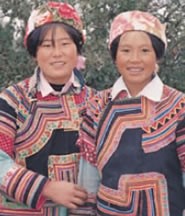Suodi in China

Photo Source:
Copyrighted © 2026
Operation China, Asia Harvest All rights reserved. Used with permission |
Send Joshua Project a map of this people group.
|
| People Name: | Suodi |
| Country: | China |
| 10/40 Window: | Yes |
| Population: | 244,000 |
| World Population: | 244,000 |
| Primary Language: | Nuosu |
| Primary Religion: | Ethnic Religions |
| Christian Adherents: | 1.00 % |
| Evangelicals: | 0.11 % |
| Scripture: | New Testament |
| Ministry Resources: | Yes |
| Jesus Film: | Yes |
| Audio Recordings: | Yes |
| People Cluster: | Tibeto-Burman, other |
| Affinity Bloc: | Tibetan-Himalayan Peoples |
| Progress Level: |
|
Introduction / History
Few people have ever heard of the Suodi. Most publications have failed to distinguish the Suodi from the Nosu, who are the largest Yi group inhabiting the Daliangshan in southern Sichuan. Although the Suodi and Nosu languages are related, they are different enough that speakers have difficulty in communicating and often must revert to Chinese in order to be understood. Just as important, Suodi is the autonym of this group. They do not call themselves Nosu or Yi. The Suodi have been included under the official Yi nationality by the Chinese authorities.
For centuries the Suodi have been caught up in violence, slavery, and warfare with their Nosu neighbors and between respective clans of Suodi. As Chinese influence expanded into the Suodi area, frequent clashes between the Suodi and Chinese soldiers erupted. In 1911 the Suodi took several hundred people into slavery to avenge a surprise Chinese attack near Huili a few weeks earlier. "Jubilant in victory, the Chinese loaded four ponies with Lolo [Suodi] heads to bring them to Ningyuanfu. Since this load was too heavy, the Chinese cut off the ears and brought them into the city to be presented to their commander."
What Are Their Lives Like?
The Suodi are engaged in a wide variety of occupations, including traders, farmers, and herders. In the past many Suodi were opium addicts, a vice that is slowly resurfacing among Suodi youth.
What Are Their Beliefs?
A complex form of polytheism is practiced by the Suodi. They worship a host of deities and spirits, hoping their devotion will prevent disaster coming upon their families and villages. They also believe in Yasomu, an all-powerful deity, and they keep ancestral tablets.
Catholic missionaries first reached out to the Suodi in Huili in 1802. In 1809, "Monsieur Hamel sent Thomas Tsin into this area, and he founded five stations, baptized seventy-four adults, and registered the names of thirty-six catechumens." American and Australian Baptist missionaries were also stationed at Huili before 1949. Little longterm work actually survived in the area. Numerous obstacles were placed before the missionaries by Chinese officials. "The desire of the missionaries was to plant a strong church among the savages in the mountains, but the opposition from both the [Suodi] and the Han Chinese was too great. They had to settle for spreading the faith among the Chinese." Today there are no more than a few hundred Catholic believers among the Suodi. Most members of this group have yet to hear the gospel for the first time.
What Are Their Needs?
The Suodi people need to put their trust and identity in the hands of the loving God of Creation who sent his son to make it possible for them to enter the Kingdom of God.
Prayer Points
Pray for the spiritual blindness and bondage to the evil one to be removed so they can understand and respond to Christ.
Pray for the Lord to provide for their physical and spiritual needs as a testimony of his power and love.
Pray the Suodi people will have a spiritual hunger that will open their hearts to the King of kings.
Pray for an unstoppable movement to Christ among them.